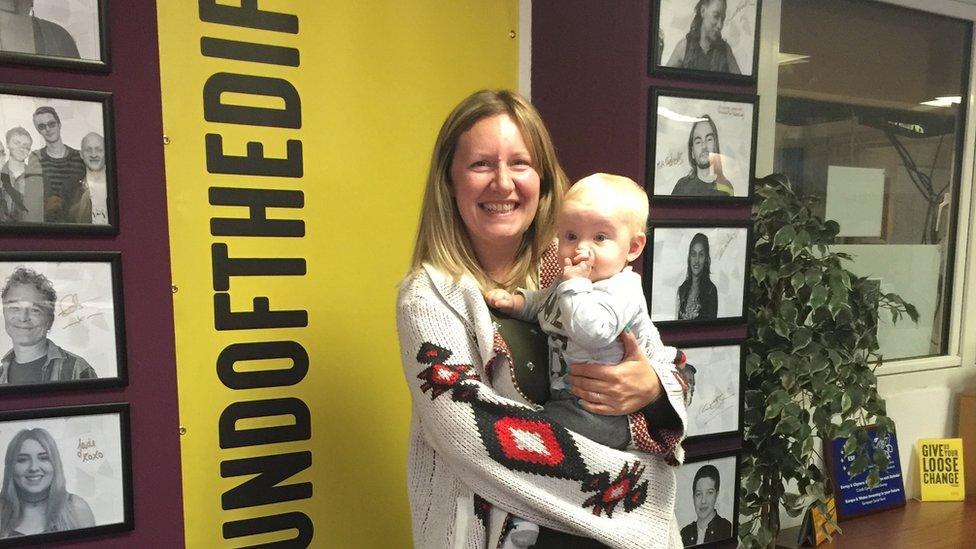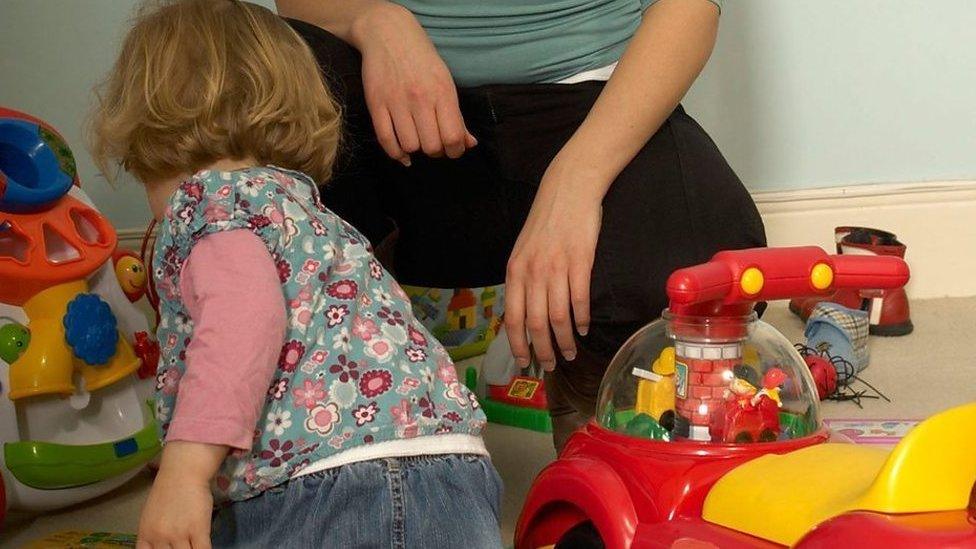Free childcare scheme 'unworkable' for working parents
- Published
These mothers have some questions to ask
A scheme offering free childcare is messy, confusing and unworkable for working parents, according to some mothers who would like to use it.
By September 2020, all working parents of three and four-year-olds in Wales will be entitled to 20 hours free childcare a week on top of the existing 10 hours early education provision., external
One mother said the policy would not not help parents return to work.
The Welsh Government said parents say the scheme makes a "real difference".
Thousands of parents are already accessing the offer through pilot schemes in certain counties, which the administration hopes will be rolled-out across the whole of Wales by 2020.
But there have been concerns over a lack of nursery places to meet the pledge and take up in the pilot areas has been lower than expected.
Helen Treharne, 43, from Newport has a two-and-a-half-year-old son who attends a private nursery for three days a week costing between £600 and £750 a month.
"It's not cheap," she concedes. "It is more than our mortgage."
Ms Treharne, a communications officer, works 30 hours a week spread across three days and also blogs as Welsh Mum Writing.
Parents share their experiences of paying for childcare.
She said in theory the offer of free childcare was "fantastic" but in reality ferrying a child between two-and-a-half hours at nursery and private childcare in the middle of each working day would be unworkable.
You may also be interested in:
"The 10 hour provision is completely pointless unless you have family who can pick up from nursery or a private nursery or a childminder who can do pick up," she said.
"Moving settings is just unworkable for us... it's not worth the effort as I'd have to reduce my hours or even change job.
"You can't drop your child off at 9:00 BST and pick them up at 11:30 because you're in work."
She said the way the scheme consists of two components - childcare and early education - was "messy and confusing".
"It needs to be one scheme with one application process," she added.
"Parents are saying to me they don't know how to apply or when to apply and what nurseries they can use."

Childcare offer explained
All children in Wales are already entitled to a minimum of 10 hours of free, part-time early education in a school, or funded nursery, in the term following their third birthday. This is usually provided in a local school, day-care setting or community centre
The Childcare Offer for Wales is offering an additional 20 hours from registered providers who have signed up with the Welsh Government to be part of the scheme
Parents will not be required to access their early education entitlement as a prerequisite to accessing the childcare element of the offer
During the school holidays, when there is no early education, the offer will provide 30 hours a week of childcare for up to nine weeks
Pilot schemes are currently under way across the whole of Anglesey, Gwynedd, Caerphilly, Flintshire and Blaenau Gwent and parts of Swansea and Rhondda Cynon Taff
On Tuesday the Welsh Government announced from September it will be available in parts of, external Cardiff, Newport, Neath Port Talbot, Conwy and Wrexham and across the whole of Torfaen and Ceredigion. It will also be extended to the whole of Rhondda Cynon Taff
Who is entitled to it?
All parents of three and four-year-olds can already access the early education entitlement
To be eligible for the additional 20 hours childcare offered by the Childcare Offer for Wales you must have a child within the age range and earn on average a weekly minimum equivalent of 16 hours at national minimum wage (NMW) or national living wage
If you are in a lone parent family you need to be working and if you are in a two parent family you both need to be working

Sarah Rees from Penarth, Vale of Glamorgan, has two children - a four-year-old girl and an 18-month-old boy.
But she said she could not afford to return to work adding: "If I did my daily childcare bill would be £100 a day.

Sarah Rees was made redundant while on maternity leave with her eldest child
"It's gutting because I really want to go back to work but I can't afford it. I spent loads on my education. I was told girls can achieve anything. Why are we telling girls that when we know they can't.
"We don't have a gender pay gap - it's a child-rearing pay gap."
But Ms Rees, who is the branch leader of Women's Equality Party South Wales, does not believe this scheme will help parents return to work: "By the time your child is three you've had to already leave your job because it's unaffordable or you've got care in place.
"It needs to be offered from nine months, when parental leave finishes and you need support. At three it's utterly too late. "

Sarah Rees wants free childcare to be offered to younger children
She shared Ms Treharne's concerns about marrying up the early education provision with childcare.
"You need a drop off service," she said. "[I have a friend who] didn't use early years education because there was no drop off. She just paid for the whole day in nursery. It says it's for working parents but it's not helping anyone get back to work."
But not everyone was concerned about the scheme. In May, some parents taking part in a pilot told BBC's Wales Live rit was working well and had saved them hundreds of pounds a month.
The Welsh Government said childcare costs placed a "significant financial burden" on working families, with it being the most commonly cited barrier to returning to work.
A spokesman said: "Parents are telling us the offer is making a real difference to them, reducing the strain on family income and giving them the opportunity to take up employment or increase their hours.
"Providers are also telling us that the offer has afforded them a level of sustainability and the opportunity to employ more staff."
He added they were considering a range of options to ensure that the early education and childcare elements of the offer aligned.
- Published30 May 2018

- Published3 May 2018

- Published19 June 2018
